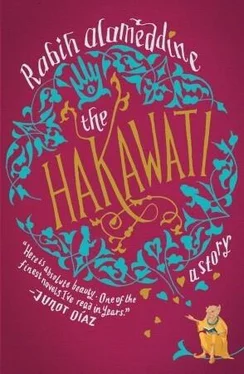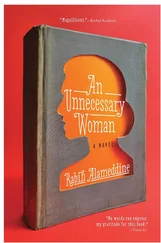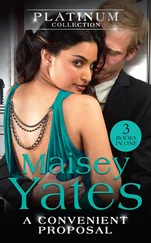“Lucine left Shoushan’s house, and on the way home she found an abandoned horseshoe on the road. ‘My luck is about to change,’ she thought. That evening, she searched for wine, but the doctor had been on a binge and there was none in the house. She took her baby out to the garden, filched an urn being used to make vinegar. She put the almost-vinegar in a stone mortar used to grind meat. She heated the horseshoe over a fire, and when it turned red, she doused it in the sour wine. And she placed her crying son in the mortar bath. But then she had no watermelon, ripe or unripe, so she cooled her baby in a tub of cold yogurt.”
I heard Fatima let out a short laugh. My sister moved her head along my back in response. I tried to ignore the consistent beeping of the monitor.
“Of course, the prescription worked — up to a point, that is. Your father survived, but he didn’t grow up to be a giant of a man, now, did he? Like all of us, he wasn’t even very big. He didn’t inherit the subtlety of wine, but the volatility of vinegar. The yogurt gave him not a bitter wisdom but a sour disposition. And the horseshoe turned out to belong not to a horse but to a mule — Lucine couldn’t tell the difference. So he did end up with the endurance of iron, but also with the stubbornness of a mule. That’s your father.”
Sunlight crept along the floor. The room lit up, but my father’s face did not take on any color. I took a deep breath.
“Your father told me that story — one of his best, if you ask me. He also told me how you were born. Do you want me to tell you? He told me all kinds of incredible things about you. He told me how you used to steal meat as it was being fried, how you used to sneak by your mother, grab the lamb from the frying pan, and run.” I checked his face for a reaction. “Can you hear me?” I closed my eyes briefly. “I know your stories.”
His chest kept rising and falling mechanically, systematically.
“And I can tell you my stories. If you want.”
I paused, waited.
“Listen.”
NOTES AND ACKNOWLEDGMENTS
By nature, a storyteller is a plagiarist. Everything one comes across — each incident, book, novel, life episode, story, person, news clip — is a coffee bean that will be crushed, ground up, mixed with a touch of cardamom, sometimes a tiny pinch of salt, boiled thrice with sugar, and served as a piping-hot tale. A brief list of sources that provided the most beans: A Thousand and One Nights (uncensored), Ovid’s Metamorphoses , the Old Testament, the Koran, W. A. Clouston’s Flowers from a Persian Garden , Italo Calvino’s Italian Folktales , Kalila wa Dimna (uncensored), Ahmad al-Tifashi’s The Delight of Hearts , Ibn Hazm’s The Ring of the Dove , Mahmoud Khalil Saab’s Stories and Scenes from Mount Lebanon , Homer’s Iliad , Jim Crace’s The Devil’s Larder, The Letters of Abelard and Heloise , Ida Alamuddin’s Maktoob , Shakespeare’s plays, numerous Internet folktale sites, and quite a few books of Syrian and Lebanese folktales bought for pennies from street vendors.
This is a work of fiction. It might sound redundant, stating the obvious, but it does bear repeating. Nothing herein should be considered fact or biography. The character of Baybars has little to do with the historical one, the character of the bey doesn’t represent any real clan leader or family, and the religion in the piece was invented to fit a better narrative (to the best of my knowledge, Zainab doesn’t appear at shrines, nor does anyone worship a Lady Zainab in blue). The tale of Baybars is based on oral stories as well as an actual hakawati’s book given to me by Maher Jarrar of the American University of Beirut (a princely gift). Readers who wish to study the history of Baybars might consider The Lion of Egypt: Sultan Baybars I and the Near East in the Thirteenth Century by Peter Thorau.
I am indebted to the John Simon Guggenheim Memorial Foundation for a most timely and generous grant. Thanks to my editor extraordinaire, Robin Desser, ever tireless and fervent; to Joy Johannessen, who kept shaking the tree till all the rotten fruit had fallen; to Asa DeMatteo, Barbara Dimmick, Jim Hanks, and William Zimmerman, readers who didn’t shy away from pointing out the inadequacies of my writing. I wish to thank Lily Oei, Carlo Togni, and Eric Glassgold for making life easier.
Everything I know about pigeons I learned from Beirut pigeoneers who were gracious enough to tell me their stories. Everything I know about guitars I learned from George Peacock of Peacock Music in San Francisco. Everything I know about maqâms I learned from listening to the inimitable Munir Bashir.
And, finally, this book wouldn’t be what it is without the input of almost every Lebanese I know, and even those I don’t know so well. Lebanon is a nation of hakawatis, and none had to be asked more than once for a story. Actually, most never needed to be asked.
I heard you’re looking for stories. Let me tell you .
You want stories about pigeons? I got pigeon stories .
I’ll tell you a story. You can put it in your book, but you can’t tell anyone. It’s private .
You have to write about my crazy aunt. You just have to. Listen .
Thank you.












